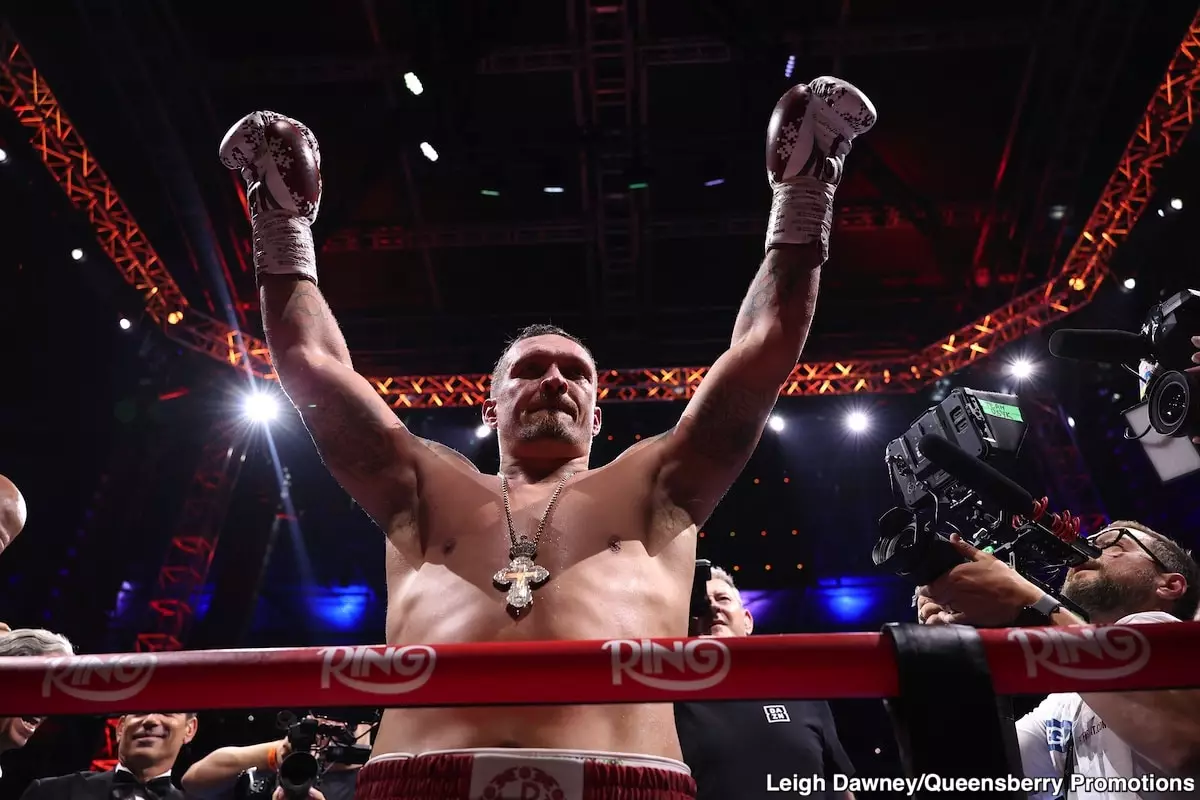In the landscape of heavyweight boxing, a new titan has emerged—Oleksandr Usyk—a fighter whose accomplishments are reshaping perceptions and sparking debates about greatness. While some dismiss his record as limited, the reality is that Usyk has redefined what it means to conquer in the heavyweight division. With only eight fights at the highest level, each victory is a testament to his relentless dedication, skill, and adaptability. In an era dominated by hype and inflated resumes, Usyk’s genuine excellence stands apart. His ability to dominate legends like Joshua and Fury, all while navigating a division filled with diverse styles and formidable opponents, showcases a rare combination of technical mastery and mental resilience.
What elevates Usyk beyond mere wins is his seamless transition from cruiserweight greatness to heavyweight dominance. Historically, fighters have often struggled to translate success across weight classes, but Usyk’s performance signals a different narrative. His victories over physically imposing figures such as Tyson Fury and Anthony Joshua—each commanding larger frames—underline that skill can sometimes outweigh size. If one considers the ancient adage that “greatness is forged in adversity,” then Usyk’s journey reflects a modern-day mythos—challenging stereotypes and proving that in the ring, intelligence, technique, and heart are paramount.
Debates on the All-Time List
When evaluating Usyk’s place in the pantheon of heavyweight legends, it’s crucial to scrutinize both his accomplishments and limitations. Critics argue that his experience at heavyweight—precisely eight fights—is insufficient for historical immortality. Yet, this narrow window of action doesn’t diminish the significance of his victories; it emphasizes the magnitude of the feats he has already achieved. Beating top-tier opponents like Joshua twice, and engaging in championship wars with Fury, all in such a brief span, makes a compelling case for his elite status.
However, ranking Usyk among the all-time best is inherently subjective. Does his limited bout count at heavyweight dilute his legacy? Not necessarily. The nature of his victories—against giants and skilled boxers—dictates that quality often surpasses quantity. Moreover, the real question is whether Usyk has truly peaked or if there’s more to come. Given his age, skill set, and adaptability, it’s plausible that his best performances are still ahead.
This debate feeds into a larger discussion—can he be placed among the legends like Muhammad Ali, Joe Louis, Mike Tyson, or George Foreman? Historically, these icons had decades of title defenses, cultural impact, and record-breaking moments. Usyk’s case differs; his reputation is built on a comparatively sparse yet impactful body of work. Nonetheless, his technical brilliance and ability to conquer diverse styles suggest he is a once-in-a-generation talent, capable of rewriting history books.
Fighters and Styles: A Different Kind of Elite
One of Usyk’s most compelling qualities is his versatility. Unlike the stereotypical bulky heavyweights, Usyk’s frame mirrors the fighters of the 1970s—lighter, agile, a master of movement. He’s shown time and again that size alone doesn’t determine success; skill, IQ, and tactical genius are equally vital. When facing opponents like Fury—who relies on size and reach—and Joshua—who possesses power and athleticism—Usyk adapts seamlessly. He’s faced pressure fighters, punchers, and clever boxers, each time overhauling their strategies with precision.
Eddie Hearn’s optimistic assessments align with the idea that Usyk could have thrived across different eras. Hearn suggests that Usyk might even beat historically dominant figures like Tyson, Holmes, or Liston. While this is speculative, it underscores how modern fighters are judged on their ability to compete against a wide range of styles. Usyk exemplifies that modern boxing is less about sheer size and more about mastering the art of the fight. His capacity to navigate different generations of fighters hints at a legacy that transcends the current landscape.
The Greatest Debates and Personal Judgments
The crux of the discussion lies in whether Usyk’s achievements warrant inclusion in the “greatest of all time”” conversation. For some purists, his limited heavyweight tenure isn’t enough for such recognition. Yet, this ignores the quality of his victories and his demonstrable skills. It also neglects the changing nature of boxing—where innovation and technique increasingly define legacies.
In my personal view, Usyk’s trajectory suggests he is underappreciated in the grand hierarchy of heavyweights. While names like Ali and Tyson are etched into cultural history, we must also recognize that era differences complicate direct comparisons. Usyk is a new kind of heavyweight—lean, technically perfect, and strategically sharp. If he continues to harness his potential, his name could eventually be placed alongside the sport’s greatest.
Eddie Hearn’s optimistic prophecy—that Usyk could beat historical icons—may now sound bold, but it’s rooted in observable truth. He’s a fighter unafraid of challenging norms, constantly seeking to elevate his craft. Whether or not he ultimately lands among the top five, the narrative is clear: Oleksandr Usyk is a rare talent whose impact on boxing is still unfolding. And in a sport obsessed with legacies, perhaps we should look beyond the numbers and recognize that true greatness is a mosaic of skill, resilience, and the lasting impression left behind.

